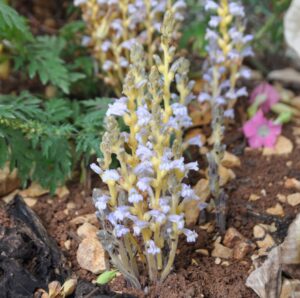Plant - plant interaction mediated by microbial activity in the rhizosphere
| Responsables(s) : | Financement(s) : |
|---|---|
 |
- Début du projet : 03/01/2023
- Fin du projet : 31/12/2026
Plant-plant interactions occur continuously in the rhizosphere and are likely to be modulated by a third partner: the microbiota. In particular, the « host plant – root parasitic plant » model constitutes a particularly illustrative example of a very fine communication in the rhizosphere which can be altered by microorganisms.
Parasitic seeds of the branched broomrape (Phelipanche ramosa) which parasitizes Brassicaceae plants, including rapeseed or the model plant Arabidopsis thaliana, are able to perceive germination stimulants exuded by the host plant at very low levels in order to initiate their germination and their biological cycle. The most important signaling pathway in the Brassicaceae rhizosphere is the glucosinolate pathway, where glucosinolates can be hydrolyzed by myrosinase enzymes of plant or microbial origin into isothiocyanates which are the main germination stimulants. These isothiocyanates also have a biocidal effect which induces a strong selection of the microbiota in the rhizosphere.
This project aims to demonstrate i/ the role of the soil microbiota in altering the metabolic profiles of glucosinolates and isothiocyanates and conversely ii / the role of the host plant, via the exudation of glucosinolates and its related isothiocyanate compounds, in structuring microbial communities having particular activities and functions.
This will be carried out by the use of mutants of A. thaliana, deprived of glucosinolate or deprived of myrosinase enzyme in the roots, and using meta-omic analyzes. The last part of this project aims to recreate artificial soil microbiota either by a culture cycle of mutants or wild type A. thaliana plants in native soils or by inoculating synthetic communities with myrosinase activities in sterilized soils and studying the fitness of parasitic plants. Ultimately, these approaches will provide solid evidence to better understand and describe this particular plant – plant communication mediated by the microbiota.
 Phelipanche ramosa
Phelipanche ramosa

